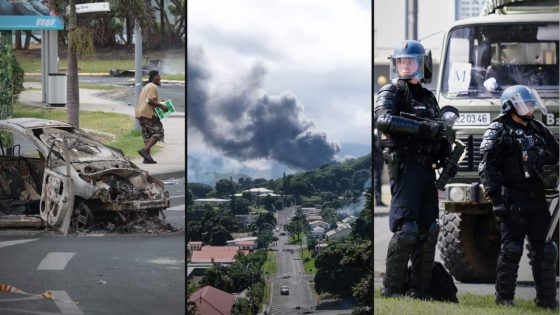Key Points
- Violence has erupted in New Caledonia after Paris discussed letting recent arrivals vote in elections.
- At least two died in the unrest as protests against the bill led to a curfew, airport shutdown and calls for police reinforcements.
- The bill has sparked fears of vote dilution among New Caledonia’s Indigenous population.
Violence has erupted in New Caledonia, a French overseas territory in the South Pacific, after politicians in Paris discussed a draft constitutional amendment to allow recent arrivals to the territory to vote in provincial elections.
At least two people have died and hundreds were injured after protests against the reform turned violent on Monday night, with shots fired at security forces, vehicles torched and shops looted in the worst unrest the French overseas territory has seen since the 1980s.
The bill, which some local leaders fear will dilute the vote of the Indigenous people of New Caledonia, known as Kanaks, is the latest flashpoint in decades-long tussle over France’s role in the island.
The protests prompted authorities to shut the international airport, impose a curfew in the capital Nouméa and call for police reinforcements.
Describing the “serious public disturbances” as ongoing, the French High Commission of the Republic in New Caledonia decried the widespread looting and torching of businesses and public property, including schools.
One business group said around 30 shops, factories and other sites in and around the capital Nouméa had been set ablaze. Source: Getty / Theo Rouby
Where is New Caledonia?
Set in the warm waters of the southwest Pacific, some 1,500km east of Australia, New Caledonia is home to 270,000 people, including 41 per cent Melanesian Kanaks and 24 per cent of European origin, mostly French.
The archipelago was given its name by British explorer Captain James Cook in 1774. It was annexed by France in 1853 and was used as a penal colony until shortly before the turn of the 20th century.
Why does it matter?
New Caledonia, one of five island territories spanning the Indo-Pacific held by France, is central to French President Emmanuel Macron’s plan to increase French influence in the Pacific.
The world’s number three nickel producer, New Caledonia lies at the heart of a geopolitically complex maritime region, where China and the United States are jostling for power and influence in security and trade.
Without naming China, Macron has previously said France’s drive to expand its influence in the Pacific was to ensure a “rules-based development.”
French President Emmanuel Macron has been seeking to reassert his country’s importance in the Pacific region. Source: Getty / Raphael Lafargue
What’s New Caledonia’s history with France?
New Caledonia became a French overseas territory in 1946. Starting in the 1970s, in the wake of a nickel boom that drew outsiders, tensions rose on the island, with various conflicts between Paris and Kanak independence movements.
A 1998 Nouméa Accord helped end the conflict by outlining a path to gradual autonomy and restricting voting to the Indigenous people and migrants living in New Caledonia before 1998. The accord allowed for three referendums to determine the future of the country. In all three, independence was rejected.
“Tonight, France is more beautiful because New Caledonia has decided to stay part of it,” Macron said after the result of the most recent vote in 2021.
Nonetheless, the 2021 poll was boycotted by pro-independence parties due to the coronavirus pandemic, and there remains lingering scepticism over the legitimacy of the result.
Why have tensions exploded recently?
Under the terms of the Nouméa Accord, voting in provincial elections was restricted to people who had resided in New Caledonia prior to 1998, and their children. The measure was aimed at giving greater representation to the Kanaks, who had become a minority population.
Paris viewed the current arrangement as undemocratic and wanted to open up the electorate to include people who have lived in New Caledonia for at least 10 years.
Following lengthy and at times tense debates, the National Assembly in Paris adopted the reform in the early hours of Wednesday, by 351 votes to 153.
Afterwards, Macron appealed for calm on all sides.
In a letter to New Caledonian representatives, he urged them to “unambiguously condemn all this violence” and “call for calm” as discussions over the territory’s future resume.




